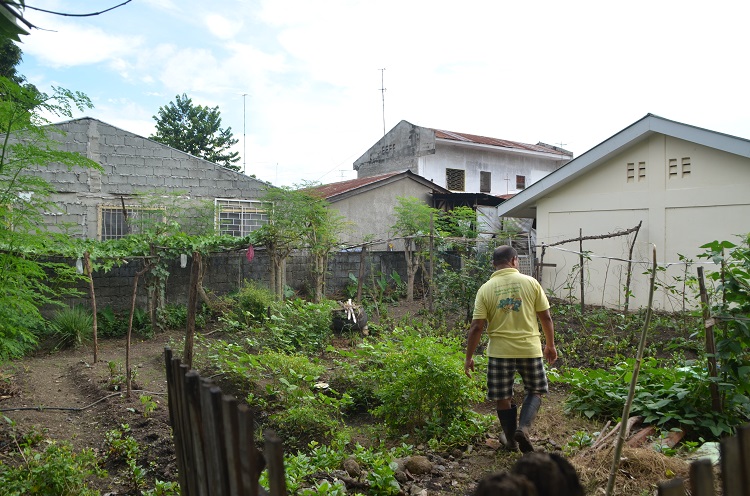
VEGETABLES GO TO SCHOOL. The Gulayan sa Paaralan Program (School Gardening Program) of Fr William Masterson Elementary School in Xavier Heights, Cagayan de Oro City was among the three schools visited by a team composed of XU, Swiss TPH, and DepEd on May 29.
Report by Stephen Pedroza
Photos by Alex Belen
In the recent joint visits to a handful of public elementary schools in Cagayan de Oro City, Xavier University - Ateneo de Cagayan’s Jose P Rizal School of Medicine (JPRSM), Swiss Tropical and Public Health Institute (Swiss TPH), and the CDO division of the Department of Education (DepEd) saw the importance of sustaining the school-based feeding and vegetable gardening programs toward improving child nutrition.
In the policy brief on “Improving Nutritional Outcomes of School Feeding for Filipino Children,” three major points were fleshed out from the Vegetables Go to School (VGtS) Program engagements:
1. Child nutrition contributes to the country’s overall development.
2. School-based feeding is crucial to the nutritional rehabilitation of children but it is not enough.
3. Good Water, Sanitation and Hygiene (WaSH) practices combined with school feeding gives better nutritional rehabilitation results.
“VGtS is an integrated school-based program that includes school gardening, WaSH, hygiene intervention, and feeding for Filipino children,” said Dr Jana Gerold of Swiss TPH.
“Based on the evidence in the Philippines and all the other countries, we have seen that only the integrated approach actually harnesses significant findings in terms of contributing to child health,” she added.
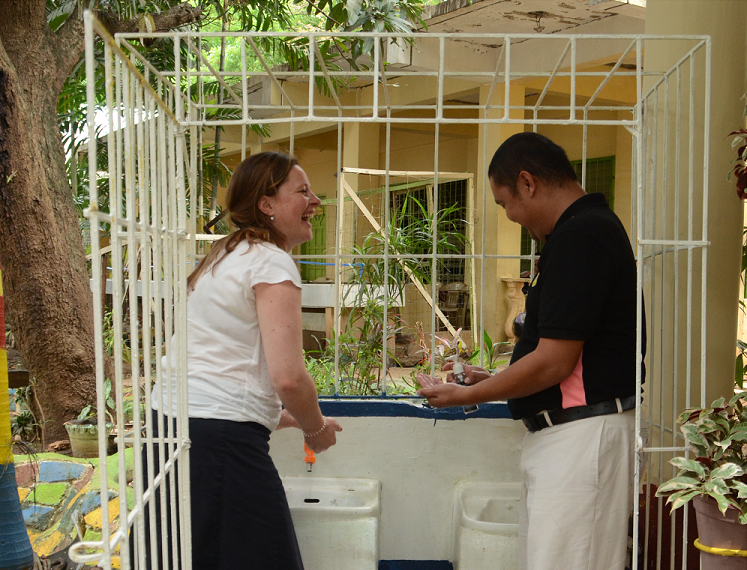
GOOD HYGIENE BEFORE EATING. Dr Jana Gerold of Swiss Tropical and Public Health Institute and the Bulua Central School principal share a laughter while washing their hands at the school's WASH facility before having lunch.
For the school year 2014-2015, VGtS utilized DepEd’s secondary data for weight, height, and Body Mass Index (before and after school feeding) of enrolled schoolchildren. For SYs 2015-2017 and 2016-2017, the said program collected its own primary data before and after school feeding.
The data from the 16 target DepEd elementary schools of Cagayan de Oro over the three academic years were analyzed and the researchers found out:
• BMI increases with 120 days of school-based feeding;
• BMI declines during vacation months;
• BMI increase is better in schools with 24/7 potable water supply;
• BMI increase is better in schools with toilets; and
• BMI increase is better in schools with year-round vegetable gardens.
The 16 elementary schools involved in CDO were: Balubal ES, Baluarte ES, Balulang ES, Bongbongon ES, Bulua Central ES, Canitoan ES, Cugman ES, Fr William Masterson ES, Indahag ES, Iponan ES, Kiam-is ES, Lapasan ES, Lumbia ES, Pedro Oloy N Roa ES, Taguanao ES, and Upper Carmen ES.
On Monday, May 29, Bulua Central ES, Pedro Oloy N Roa ES, and Fr William Masterson ES were visited by the team prior to the opening of classes in June. The team met with the school principals, feeding and gardening officers to talk about the outcomes, challenges, and recommendations on VGtS and its partner institutions, such as Gawad Kalinga and various food manufacturing companies.
The XU-Swiss TPH-DepEd team also met with CDO Mayor Oscar Moreno for a courtesy call, which also served as an opportunity to thank the city leader for his active support in the program.
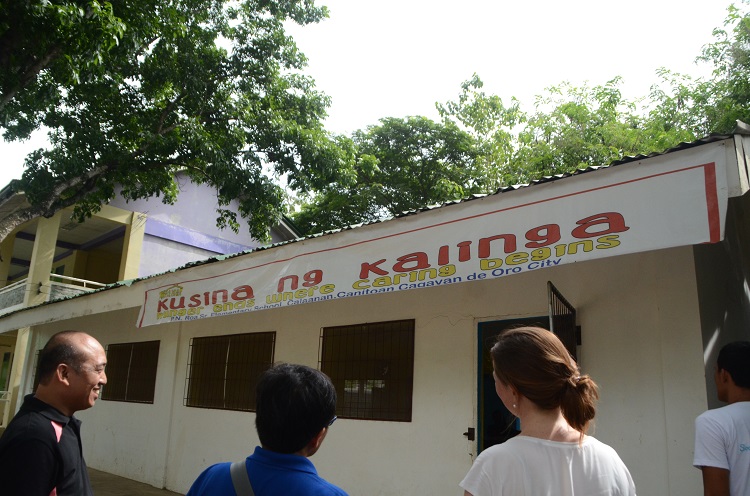
HUNGER ENDS WHERE CARING BEGINS. One of the active partners of the Vegetables Go to School Program is the non-government organization Gawad Kalinga. For Pedro Oloy Roa Elementary School, GK was instrumental in the establishment of "Kusina ng Kalinga" in Canitoan, Cagayan de Oro City.
Paradigm shift in child nutrition
In the Philippines, child nutrition remains a tough challenge. According to the Global Nutrition Report 2016, the country ranks globally among the top ten for stunted children. Three out of 10 school children aged 6 – 12 years old remain short for their age (stunted) and have not attained the optimum weight for their heights (wasted).
In addressing this issue, schools play an important role in nutrition rehabilitation.
According to the VGtS researchers, part of achieving sustainability is addressing the constraints in school-based feeding programs, which include the following:
a) Inadequate administrative support for the school-based feeding program as evidenced by frequent re-shuffling of teachers in charge of feeding and gardening, inadequate training of replacement teachers, and lack of proper equipment to monitor weight and height.
b) Water and WaSH facilities should be available in all schools. Many schools have no running water, or at best, water comes for a few hours on certain days of the week. When there is no running water, hand washing facilities and toilets remain unused and children are not able to benefit from healthy practices.
c) School gardens contribute to good nutritional rehabilitation outcomes. Many schools have vegetable gardens which do not last the whole school year (10 months) because of many reasons, such as lack of water, inadequate space for a garden, and lack of a teacher-in-charge of gardening.
The VGtS Program also emphasized the fact that schools which have year-round vegetable gardens showed a better gain in BMI for children who were enrolled in the school-based feeding program compared to schools which did not have year-round vegetable gardens.
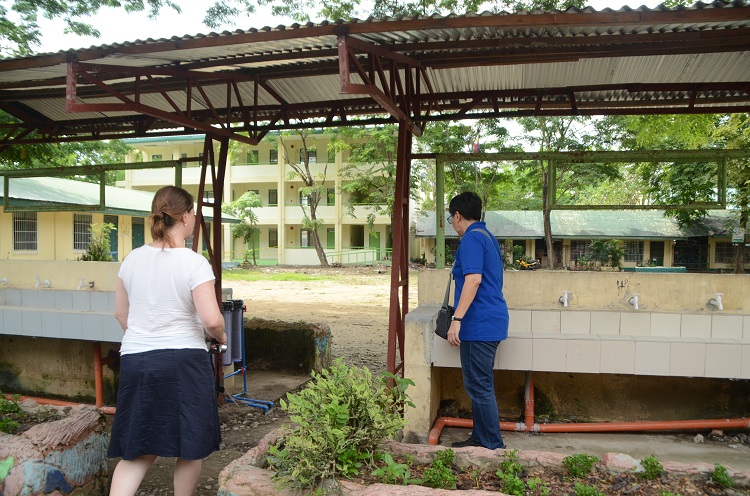
WASH HANDS. Xavier Ateneo's Dr Gina Itchon (right) inspects the water faucets of the hand-washing facility at Pedro Oloy Roa Elementary School. VGtS believes that good Water, Sanitation and Hygiene (WaSH) practices combined with school feeding gives better nutritional rehabilitation results.
Beyond nutrition
Nutritional rehabilitation also directly contributes to Sustainable Development Goal (SDG) 2 which aims to end hunger, achieve food security, improve nutrition, and promote sustainable agriculture.
VGtS is present in five countries, namely, Bhutan, Burkina Faso, Indonesia, Nepal, and the Philippines.
For our country, Cagayan de Oro City was an ideal area, said Dr Gerold: “Cagayan was chosen for this project because it has a long-standing history, contribution, and commitment towards allotment of resources to school gardens and feeding programs. These programs were under the major commitment of the previous provincial governor and now the mayor of the city, in collaboration with Xavier University. The Department of Education also laid the ground for a successful partnership in the southern Philippines.”
Dr Gina S Itchon, director of Xavier Ateneo School of Medicine – Sustainable Sanitation (SuSan) Center and VGtS-Philippines country manager, shared how the program is honing future doctors in community medicine.
“We used this program to complete the education of our medical students. I brought my first-year students to some of the schools so that they will see the actual situation of nutrition among schoolchildren,” Dr Itchon said.
“It’s one thing to learn it from the books, what is ideal in the classroom and in the laboratory. But it’s another thing to see the face of a malnourished child. I think that is very important for us to build doctors who will be relevant and who will work for the Philippines, especially here in Cagayan de Oro City,” she continued.
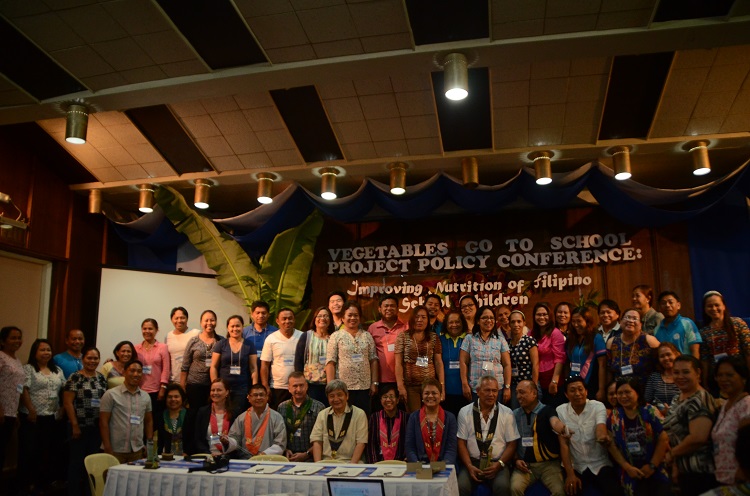
INTEGRATING VGTS IN LOCAL POLICY. The "Vegetables Go to School Project Policy Conference: Improving Nutrition of Filipino School Children" was held at XU - Southeast Asia Rural Social Leadership Institute on May 30.
Dr Itchon hopes that this new breed of doctors, who have been immersed in poor and marginalized communities, will not end up as “doctors for export,” but who will help solve the country’s healthcare problems.
“When I attended the first meeting on VGtS and it was offered to Xavier as a project, I immediately said yes because it’s addressing the pressing issue of malnutrition. It also complements the education of our medical students. Outreach is also university concern for Xavier,” she shared.
As evidenced by children being too short for their ages and being too thin for their heights, chronic malnutrition is an urgent national matter which should be addressed. This is the reason why Dr Gerold, Dr Itchon, other team members, and project partners believe that sustaining integrated, school-based feeding programs is as crucial as looking for more innovate ways on continually improving the nutrition of Filipinos at the early stage.
The message of VGtS is clear: “Improved nutrition is the platform for progress in health, education, and employment which will eventually help the Philippines achieve sustainable development.”∎
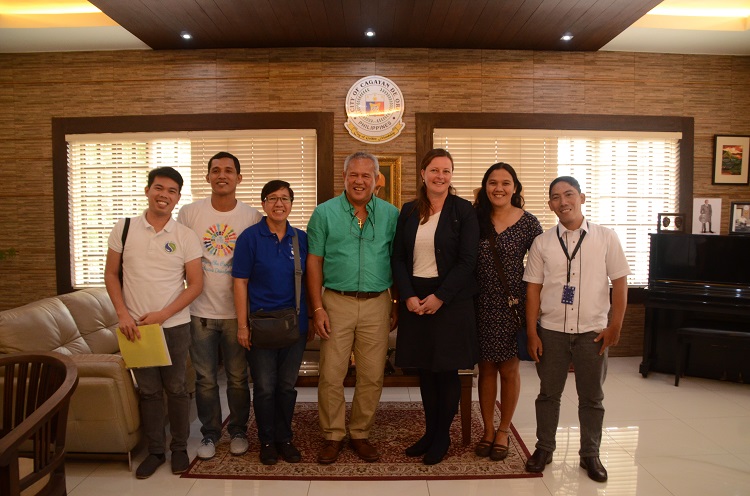
LOCAL SUPPORT. The XU-Swiss TPH-DepEd team also met with CDO Mayor Oscar Moreno for a courtesy call, which also served as an opportunity to thank the city leader for his active support in the VGtS program.